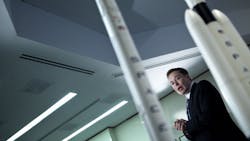Musk: Failed Strut Caused SpaceX Blast
The explosion last month of SpaceX’s Falcon 9 rocket was caused by a failed support piece, or strut, that allowed a helium bottle to burst free inside the rocket’s liquid oxygen tank, CEO Elon Musk said Monday.
“One of those struts broke free during flight,” Musk told reporters on a conference call to discuss the June 28 blast on what was supposed to be a routine cargo mission to the International Space Station. “So the helium bottle would have shot to the top of the tank at high speed.”
Musk noted that the findings are the preliminary results of a weeks-long investigation by the California-based company.
The accident caused NASA to lose $110 million in equipment bound for the astronauts living in orbit, a U.S. space agency spokesman told Congress earlier this month.
“Several hundred struts fly on every Falcon 9 vehicle, with a cumulative flight history of several thousand,” SpaceX said in a statement. “The strut that we believe failed was designed and material certified to handle 10,000 pounds of force, but failed at 2,000 pounds, a five-fold difference. Detailed close-out photos of stage construction show no visible flaws or damage of any kind.”
The struts in question are each two feet long and an inch thick, and were furnished to SpaceX by an outside supplier.
“We are not going to use these particular struts in the future,” Musk said, adding that the company plans to begin individually testing each strut ahead of future launches.
Musk said SpaceX would return to flight with the Falcon 9 “no sooner than September.” He also said the problem is not expected to delay the company’s goal of sending astronauts to space aboard its Dragon spaceship within the next two years.
Musk, the billionaire cofounder of PayPal who also heads Tesla Motors, said that SpaceX had had a seven-year record of safety in flight until the accident happened. He admitted that SpaceX may have become “a little bit complacent,” and that the blast offered an “important lesson” for the future.
The explosion happened just over two minutes after the rocket blasted off from Cape Canaveral, Florida. The rocket failure was the third in a series of cargo disasters in the past eight months. In October, US company Orbital’s Antares rocket exploded after launch from Virginia, and in April, Russia lost contact with its Progress cargo ship shortly after liftoff.
by Kerry Sheridan
Copyright Agence France-Presse, 2015
About the Author
Agence France-Presse
Copyright Agence France-Presse, 2002-2025. AFP text, photos, graphics and logos shall not be reproduced, published, broadcast, rewritten for broadcast or publication or redistributed directly or indirectly in any medium. AFP shall not be held liable for any delays, inaccuracies, errors or omissions in any AFP content, or for any actions taken in consequence.
